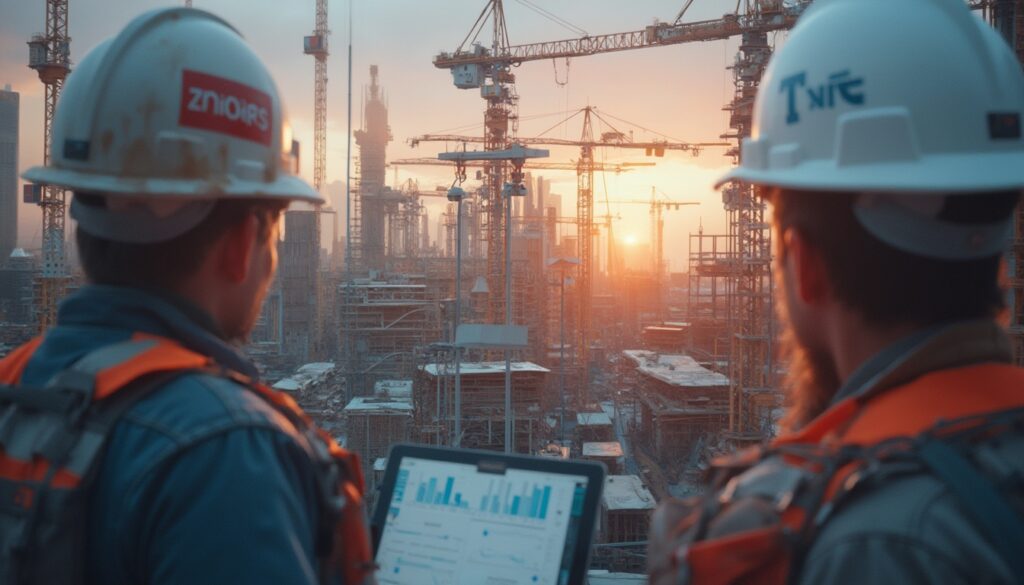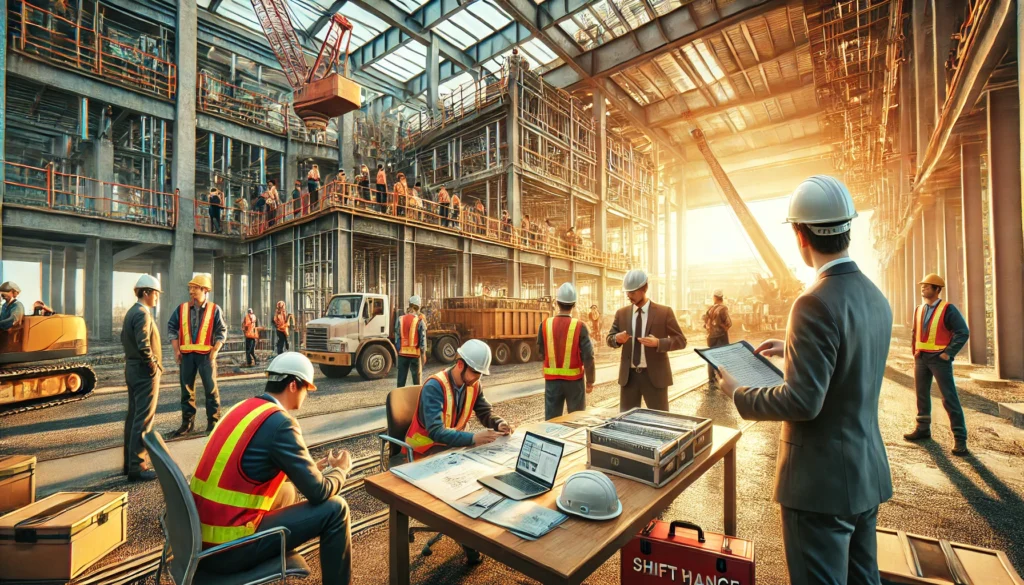The cost problem: Why 7 out of 10 large projects go off the rails
The statistics for large projects in Germany are sobering. According to a study, public projects are, on average, 73% more expensive than planned. In the transport sector, the additional costs amount to 33%, while public buildings see increases of 44%. Other analyses suggest that up to 70% of all commercial projects miss their targets or exceed their budgets. The causes often lie in shortcomings during the planning and management phases. According to experts, lack of knowledge transfer and late involvement of stakeholders are two of the biggest pitfalls. These deficiencies lead to expensive rework and delays that burden a project from the very start. Therefore, creating a solid foundation for the success of the project is crucial. The problems are thus less technical in nature and have their roots in organization and communication.
Communication chaos as the main cause of project failure
In practice, it becomes clear that unstructured communication is one of the biggest cost drivers. Information gets lost in countless WhatsApp groups, instructions are unclear, and documentation is incomplete. This leads to a phenomenon that experts call ‘silo mentality,’ where departments and project teams work in isolation from each other. The absence of a central information source means that 49% of projects exceed their timeframe. Without continuous and traceable communication, there’s no foundation for legally secure construction documentation. This lack of transparency not only complicates daily work but also poses an unpredictable risk for later warranty claims. Successful large projects therefore require a clear and simple communication structure, as recommended in the Guide for Large Projects .
Success Factor 1: Continuous and legally secure construction documentation
Clean construction documentation is not a tedious obligation, but a vital value driver. It serves as legally valid evidence and creates transparency for all project participants. However, manually creating daily construction reports is error-prone and often costs more than 5 hours a week per project manager. Valoon solves this problem by automatically and legally securely archiving all communication on the construction site—from simple messages to timestamped photos. By digitally capturing this information, human errors in data entry are minimized, and a precise data basis is established. The system generates comprehensive daily construction reports at the push of a button. Here are the key benefits:
- Automatic archiving: Every message and image is stored unalterably with time and location stamps.
- Legal certainty: The documentation is GDPR-compliant and can be used as evidence in court.
- Time savings: Manual report generation is completely eliminated, saving up to 80% of time.
- Completeness: All agreements, defects, and progress are fully traceable.
This structured data collection is a central building block for successful project management in construction and prevents misunderstandings before they occur.
Success Factor 2: Efficient processes through simple digital tools
Digitalization is the key to increasing productivity in construction. However, the acceptance of new software on the construction site is often low. Complex applications with high training requirements fail in practice. Valoon therefore relies on the world’s most widely used communication app: WhatsApp. Employees on the construction site do not need a new app or a training day. They communicate as usual while Valoon ensures the necessary structure and legal certainty in the background. This approach lowers the entry barrier to zero and secures acceptance from the entire team. The simple operation leads to a demonstrable increase in efficiency in key processes:
- Defect management: Defects are documented with photos, assigned to a responsible person, and the completion status is tracked directly in the chat.
- Time tracking: Employees can simply report their working hours via message, and the data is automatically processed for payroll.
- Measurement documentation: Measurements can be documented directly on-site and sent to the office for immediate invoicing.
- Resource planning: The coordination of personnel and equipment is simplified through clear communication channels.
By streamlining these processes, not only is the controlling of large projects improved, but also the foundation for their economic success is established.
Success Factor 3: Overcoming language barriers in international teams
On modern construction sites, teams from many different countries work together. Language barriers pose a significant risk to work safety and often lead to misunderstandings with costly consequences. An instruction that is not correctly understood can disrupt an entire day’s work or lead to serious construction defects. Valoon has solved this problem with an integrated live translation feature. Every message sent through Valoon can be translated into over 20 languages. A construction manager from Germany can write his instructions in German, and an employee from Poland or Romania can read them immediately in their native language. This feature ensures clarity and safety. It ensures that all participants, regardless of their background, receive and understand the same information. This is a crucial step to prevent the failure of large projects and ensure smooth collaboration.
Conclusion: Your advantage with Valoon for successful large projects
Successful large projects are the result of precise planning, but above all of excellent communication and continuous documentation. The high cost overruns and delays that plague many projects are avoidable. Valoon provides you with the essential tools to navigate around the typical pitfalls. We replace communication chaos with a structured, legally secure, and extremely simple solution that is immediately accepted on the construction site. You benefit from maximum efficiency, minimized risks, and save valuable time. Take the crucial step towards digitizing your construction communication and lay the foundation for your project success. Secure the future of your construction projects by opting for a solution specifically designed for the challenges of the construction industry.
Are you ready to put your projects on the path to success? Book your free demo now and discover how Valoon can revolutionize the communication and documentation in your company.
More Links
Statista offers an infographic about the largest cost increases in large projects.
Das Federal Ministry of Transport provides information about the Reform Commission for Large Projects.
Der ZIA (Central Real Estate Committee) publishes its Spring Report 2024.
Das Federal Institute for Research on Building, Urban Affairs, and Spatial Development (BBSR) offers an online publication on building, urban, and spatial research.
Wikipedia provides a comprehensive article on construction project management.
Der Taxpayer Federation publishes an article on the cost explosion in public projects and how to contain it.
Der SWR provides a chronology of cost increases for the Stuttgart 21 project.
Wikipedia contains a detailed article on construction costs.
FAQ
How does Valoon ensure the legal security of documentation?
Valoon automatically archives all communication including photos, videos, and documents, inalterably and with a timestamp and location. All data is stored in GDPR-compliant conditions on German servers, making it suitable for legally secure evidence.
Is Valoon suitable for small and large construction companies?
Yes, Valoon is designed for companies of all sizes. The platform is scalable and is suitable for both small craft businesses and general contractors managing complex and successful large projects with many subcontractors.
Do my employees on the construction site need to install a new app?
No. That is Valoon’s crucial advantage. Your employees on the construction site and your subcontractors continue to communicate via WhatsApp as usual. Only the project managers in the office use the Valoon web interface for control and evaluation.
How does the live translation feature work?
The live translation is integrated directly into the chat. A message can be written in one language and automatically translated by the recipient into one of over 20 selectable languages. This ensures clear communication in international teams.
What costs are associated with use on the construction site?
For employees on the construction site, the use is completely free, as they simply use their existing WhatsApp. Costs are only incurred for users in the office who utilize the full functionality for project management and documentation.
How quickly can I start with Valoon?
You can get started within minutes. The setup is straightforward and requires no complex IT integration. After a brief introduction, you can create your first project and immediately begin structured communication.








